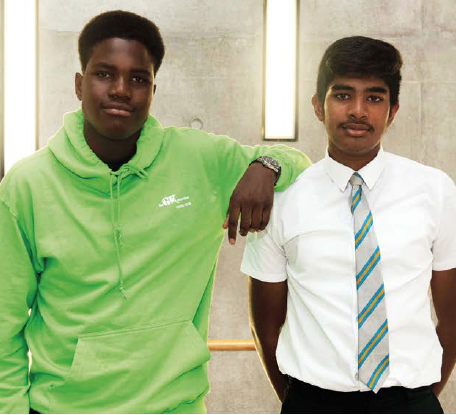Building public support to reduce poverty means telling a new moral story. This is it ...
27 Feb 2019
Responding to Call 1 of our 25 Calls campaign from Josh, Rebecca, Divine and Somer, Poverty Alliance’s Communications Officer Frances Rayner argues that we must appeal to people’s in-built sense of justice – and focus on redesigning our economy to work for all
Call 1: Change the language of poverty: young people deserve dignity, not stigma and discrimination
In their call, Josh, Rebecca, Divine and Somer powerfully remind us of the real-life damage we can cause when we tell stories about people living on low incomes. They are right to point out that even well-meaning attempts to highlight the problem of poverty can enforce stereotypes, lower self-confidence and affect society’s expectations of people. When people’s stories are characterised solely by trouble and strife, it robs people of their dignity.
The authors call on us all to look for people’s ‘strengths amidst the troubles’, focus more on solutions, and crucially, allow people to tell their own stories. Josh, Rebecca, Divine and Somer say that when they tell their stories they do not gloss over their struggles, but they are not defined by them.
As the Nigerian novelist Chimamanda Ngozi Adichie cautioned, when we tell only the negative stories that make up a person’s life, we flatten people’s experience, create stereotypes and make a single story become the only story (click to watch).
But, Josh, Rebecca, Divine and Somer are right to recognise that this is not an easy challenge. Stories are one of the most powerful ways to bring an issue to life and challenge people’s perspectives. We are hardwired to understand the world through stories. And they can bring us closer together.
When told well, stories that show how our economy creates and sustains poverty can activate people’s sense of compassion and justice. They can make them receptive to listening to the solutions we need to end poverty.
Ending the stigma that people living on low incomes face and building public support for the policies we need to solve poverty are among our top priorities at Poverty Alliance.
To achieve this, we need a new story; a story about the kind of society we want to live in, a story about our shared values of justice and compassion and a story about the ways our society can push people under or help people stay afloat.
Most importantly, we need a story about the solutions to poverty that inspire people to believe that we can redesign our economy so it works for everyone. This will be a far cry from individualised stories of hardship.
Thankfully, we have a toolkit to work from.
The Joseph Rowntree Foundation recently commissioned the FrameWorks Institute to conduct a two-year investigation into attitudes towards poverty and tested new ways to challenge stigmatising beliefs.
In the course of interviewing 20,000 people across the UK, the researchers found that in addition to the negative attitudes Josh, Rebecca, Divine and Somer will be all too familiar with, the study found some really positive beliefs. In fact, the same person will often hold both positive and negative beliefs at the same time.
Our job is to tap into the positive beliefs people hold to trigger a different way of thinking. We achieve this by telling a moral story that:
- Starts with poverty, not politics or ideology
- Appeals to our sense of compassion and justice
- Uses messengers who embody these values
- Explains how the economy locks people in poverty
- Explains how we can redesign our economy to work for everyone
- Uses examples that illustrate poverty (eg food bank use or rising homelessness) rather than statistics, and
- Showcases the solutions to poverty.
Using personal stories to talk about poverty should be done with great consideration and caution. People must be able to tell their own stories. These stories should convey the richness of people’s lives and show people’s resilience in the face of challenges.
At the same time, we must be careful not to inadvertently tell stories of individual heroism that can lead people to believe that the constraints of poverty can be easily overcome through sheer determination alone. This line of thinking can encourage people to stigmatise those who aren’t perceived to be thriving in the face of adversity.
At the Poverty Alliance we’re providing media training for people and groups who have experienced living on low incomes so that people can tell their own stories in a way that will effectively build public support for the policies to tackle poverty.
Tackling stigma won’t happen through changing the media narrative alone. Stigma is often felt most when people access services or in everyday conversations. We are currently reviewing our long-running anti-stigma campaign Stick Your Labels to ensure we’re working effectively with service providers to challenge stigma.
Josh, Rebecca, Divine and Somer’s plea should be a stark reminder to all of us who talk about poverty that we have to get this right. We need a new moral story of poverty about the society we all want to live in, with dignity at its heart.
Frances Rayner is Communications Officer at Poverty Alliance. She is responding here to Call 1 of our 25 Calls campaign contributed by Josh, Rebeca, Divine and Somer: Change the language of poverty: young people deserve dignity, not stigma and discrimination. Click here to read the call
The Poverty Alliance is running free training sessions to help people talk about poverty differently. For more information, email frances.rayner@povertyalliance.org.
Click here to download the Talking about Poverty summary report from the Joseph Rowntree Foundation
Click here to read more about The Frame Works Institute
Click here to read more about the work of the Joseph Rowntree Foundation

About the author
Frances Rayner is Communications Officer at Poverty Alliance
Click to find out more
Call 1
Change the language of poverty: Young people deserve dignity, not stigma and discrimination
Click to read the full call25 Calls campaign
Find out more about the 25 Calls campaign, view press coverage and read further responses
Click to find out more